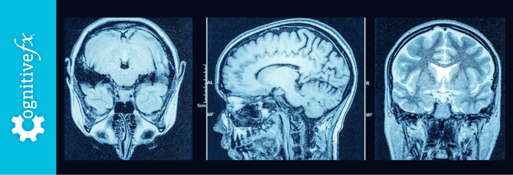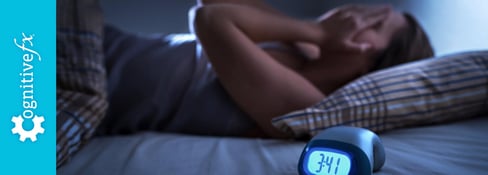Yes, Long COVID Can Cause POTS and Dysautonomia
Your heart races when you stand. You hate the dizzy spells. Your head hurts, you’re exhausted, and you can’t think clearly like you used to.
Published peer-reviewed research shows that Cognitive FX treatment leads to meaningful symptom reduction in post-concussion symptoms for 77% of study participants. Cognitive FX is the only PCS clinic with third-party validated treatment outcomes.
READ FULL STUDY
Memory and attention problems are common in long COVID patients: A recent study showed that 70% of COVID long haulers experience memory and concentration difficulties for months after their initial disease. If you’re one of them, you might struggle to focus on work, forget where you left your keys, struggle to remember an acquaintance’s name, or space out unintentionally during a conversation.
Many clinicians do not have the appropriate information or experience to address cognitive symptoms associated with long COVID. As a result, you might struggle to find medical professionals who can help you with those symptoms.
At Cognitive FX, we take the long-term complications of COVID-19 seriously. What’s more, we have the technology to detect brain dysfunction caused by long COVID. Our therapists and doctors can identify which areas of your brain need help and will develop a treatment plan specifically to address your symptoms. We also evaluate your autonomic nervous system, vestibular system, visual system, and other areas of your health that may have been affected by COVID-19.
In this article, we will explain…
Our treatment was originally designed to help post-concussion patients recover from persistent symptoms. After just one week of treatment, over 90% of our patients show improvement. Thus far, we’ve seen similar results with long COVID patients who pass our current screening criteria. To discuss your specific symptoms of COVID-19 and determine whether you’re eligible for treatment at our clinic, schedule a consultation.
From the moment we are born, our brains are bombarded with an incredible amount of information. Not everything is worth keeping, but our memory allows us to hold on to things we learn and experience throughout our lives. It gives us the ability to remember past events and develop relationships and personal identity.
Our memory can process large amounts of information, including images, sounds, smells, feelings, words, and so forth. We can retain different types of memories for various lengths of time:
.jpg?width=552&height=453&name=image2%20(1).jpg)
Forming a new memory can be divided into four steps: encoding, consolidating, storing, and retrieving information.
Memory encoding is the initial step to forming a new memory. You have to be able to focus your attention on a certain item, such as the words written in a book or the storyline of a TV show. In simple terms, encoding is a way to transform internal thoughts and external information into short-term and long-term memory.
Because COVID-19 can trigger issues with attention, many of our patients have difficulty encoding new memories. Their brains don’t focus enough in the beginning to form the memory.
After encoding memories, your brain needs to consolidate them so that they can be stored for longer. This process happens while we sleep.
Although the exact mechanism is still a mystery, researchers believe consolidation occurs for different types of memories at different stages of sleep. For example, some studies suggest that consolidation of facts — like remembering that the capital of France is Paris — occurs during deep sleep, while remembering a sequence of steps happens during lighter sleep.
Once consolidated, memories can be stored long-term. For this to happen, they have to be organized and structured. For example, memories tend to be stored “next” to other similar memories, which makes them easier to recall. That’s why seeing a specific place or smelling a familiar scent can activate specific memories.
The final step involves memory recall to remember information previously encoded and stored in the brain. During this process, the brain “replays” the neural activity originally generated during that specific event. The same memory is stored in different locations (for example, the sound is stored in one place, smells in another, and so on), so retrieving is more complex than just taking one item from storage. It involves rebuilding the relevant information from the scattered, puzzle-like information in the brain and is prone to errors.
-3.jpg?width=552&height=531&name=image3%20(1)-3.jpg)
While it's tempting to think of human memory working the same way as computer storage or a tape recorder that you can play back whenever you want, our memory is far from perfect.
People often forget or misremember things. Other times, information is not encoded correctly in the first place, or people actively try to forget things that they don’t want to remember. This type of memory loss is normal.
However, memory loss can be a sign of serious conditions, including long COVID. After acute COVID-19 infection, seven in ten patients continue to suffer for months with cognitive symptoms, such as difficulties concentrating, brain fog, and memory loss. A recent study suggested that even people who don't really notice signs of cognitive problems can have issues with memory and attention after recovering from a mild case of COVID-19.
While the exact mechanisms causing these cognitive deficits remain a subject of research, they probably include one or more of the following:
Researchers know that patients with long COVID often experience dysfunction of the autonomic nervous system. In simple terms, the ANS controls myriad automatic functions in the body, such as blood pressure, heart rate, and breathing patterns. Most of this control is exercised through a dynamic, counterbalancing interchange between the sympathetic (SNS) and the parasympathetic (PNS) nervous system. Under normal circumstances, the PNS and SNS work together so your body can respond to changes in its environment at a moment’s notice.
However, long COVID disrupts this balance, causing symptoms such as exercise intolerance, headaches, blood pressure changes, urinary incontinence, heart palpitations, problems breathing, brain fog, and memory problems.
Although the exact way in which ANS dysfunction in long haulers causes memory loss is unknown, some studies show that the ANS plays a significant role in memory consolidation during sleep and in improving working memory.
Another way in which the SARS-CoV-2 infection affects long haulers is by disrupting the normal distribution of nutrients and oxygen within the brain. In a healthy brain, nerve cells receive the resources they need from surrounding blood vessels. This connection is called neurovascular coupling (NVC) and relies on a dynamic signaling system in which the nerve cells can “order” what they need.
However, after a COVID infection, many areas in the brain struggle to perform their functions because they no longer receive the resources they need. This is called neurovascular coupling dysfunction. Depending on which areas are affected, patients may experience various types of physical and cognitive impairment. For example, vascular deficiencies in the hippocampus contribute to forgetfulness and lower executive function. Patients may experience difficulties in processing and retrieving different types of memories.
When patients contract COVID, their bodies trigger an immune response, attracting immune cells to the site of the viral attack to deal with the invading virus. This is a normal response; for most patients, the immune system calms after a few days.
However, this response may get out of control, resulting in a generalized hyperinflammatory response. There is some evidence to suggest that this exaggerated response may be behind working memory and consolidation memory problems in patients with long COVID.
As described earlier, sleep is vital for the formation and consolidation of memories. Getting enough high-quality sleep helps with attention, concentration, memory, problem-solving, creativity, emotional processing, and judgment.
For some patients, long COVID causes sleep disorders, which in turn cause memory issues. Poor sleep impairs memory consolidation by disrupting the sleep cycles. Studies have also found that people who are sleep deprived are more likely to form false memories and have poorer working and visual-spatial memory.
Shortness of breath and other breathing problems are some of the most common symptoms of COVID-19. Recently, researchers realized this actually affects memory encoding, recall, and consolidation.
We think that ANS dysfunction may be involved in this process. When you focus on something, your brain might signal an increase in sympathetic nervous system activity, leading to a short-term increase in breathing rates. Under normal circumstances, the parasympathetic nervous system brings breathing rates back to normal. But in patients with long COVID, the sympathetic branch might stay dominant. Both increased sympathetic activity and decreased parasympathetic activity are associated with worse performance in cognitive function, including memory and attention.
.jpg?width=1999&name=image8%20(3).jpg)
If you’re experiencing memory issues after COVID, you may need specialized treatment to improve your symptoms. It is unlikely that this symptom will go away by itself; instead, your best option involves a series of multidisciplinary therapies to address the problems caused by COVID.
At Cognitive FX, while we will provide treatment focused on your memory issues, it will also address your condition as a whole. We target as many of your symptoms as we can, including neurological symptoms such as headaches, brain fog, exercise intolerance, breathing issues, and difficulty concentrating.
Further reading: How we adapted our mTBI treatment program for COVID long-haulers
All patients coming to our clinic undergo a complete examination before starting treatment. As part of this assessment, you’ll undergo a brain scan with our state-of-the-art imaging technology. Thanks to this imaging technique — called functional neurocognitive imaging (fNCI) — our doctors can identify which regions of your brain are suffering from NVC dysfunction. In practical terms, the scan looks at blood flow dynamics in 56 areas in the brain while you perform a series of cognitive tests. It also looks at how these regions communicate with each other.
-2.jpg?width=552&height=256&name=image9%20(1)-2.jpg)
We then use the results from the brain scan and the medical examination to design a custom-made treatment plan, which we call Enhanced Performance in Cognition Treatment, or EPIC for short.
For example, the scan above shows unexpectedly low function in the right anterior cingulate cortex (rACC, in blue). rACC is crucial in sustained attention and plays a role in other types of attention as well. Poor NVC function in the rACC could negatively affect memory. As a result of this data, Cognitive FX therapists would make sure to include sustained attention exercises during therapy for this patient.
During treatment, you will follow a three-step process to maximize your chances of recovery:
You’ll go through this sequence several times during treatment to restore healthier neurovascular coupling, improve ANS function, and reduce the incidence and severity of long COVID-19 symptoms, including memory problems. EPIC treatment also helps with sleep quality, sensory processing, and breathing — all additional causes of memory difficulties after COVID-19.
.jpg?width=1999&name=image1%20(2).jpg)
Our treatment combines aerobic activity with a variety of therapies, including cognitive, sensorimotor, neuromuscular, and vision therapies, to name just a few. These therapies work in combination to help your whole system recover from lingering COVID-19 effects.
Therapy where you’ll do the most work on memory is cognitive therapy. It involves a series of activities and exercises that encourage thinking, concentration, and memory. For example, working on short-term memory may simply involve reading information about something and then answering a few simple questions to see how much information you can retain. Or, you might memorize a series of photographs to recall at your appointment the next day.
Cognitive therapy also involves exercises to improve your attention. For example, a game for selective attention — the ability to focus on only one thing — involves tapping whenever you hear a pair of opposite words in a continuous list (such as ‘room’ ‘hot’ ‘cold’ ‘bear’ ‘door’), but you need to be able to ignore the news radio playing in the background.
.jpg?width=1999&name=image4%20(2).jpg)
Our therapists can also work your divided attention — the ability to quickly switch between tasks — by having you sort cards into their suits with the cards facing down (after memorizing which suit goes where), and at the same time, doing simple addition and subtraction. These multitasking exercises, when combined with the rest of our treatment protocol, can work wonders for post-COVID cognitive difficulties.
You will also learn several breathing exercises that can be particularly useful for helping long COVID-19 patients with their memory issues. A study showed that diaphragmatic breathing improves attention and memory by promoting the delivery of oxygen to the brain. Diaphragmatic breathing is a technique that involves a deep inhale through the nose focusing on using the diaphragm, followed by a slow exhale. Breathing more efficiently helps the body slow down breathing rates and promotes the activity of the parasympathetic nervous system.
After treatment, our therapists meet with you one last time to assess your progress and to give you a few exercises to continue doing at home. The list typically includes a few aerobic exercises and cognitive activities. Adherence to these recommendations is a good way to ensure long-term recovery. Many patients continue to improve at home in the weeks and months that follow treatment.
-2.jpg?width=1000&name=image5%20(3)-2.jpg)
COVID long haulers need to be patient and persist in their training both in therapy and at home to see significant results. Here are a few at-home practices that can help.
One of the ways to prevent memory loss and other cognitive issues is through physical activity. Multiple studies show that exercise benefits the brain and may help improve memory. For example, a single 15-minute session of moderate exercise on a stationary bike is enough to improve cognitive performance and memory. Sometimes exercise is difficult post-COVID-19. If that’s the case for you, see our guide to safe exercise after a brain injury.
Many studies show how cognitive activities can help keep your brain in shape and limit the effects of memory loss. For example, 15 minutes of brain-training exercises at least five days a week can improve short-term memory, working memory, concentration, and problem-solving.
There are many activities you can do at home, from crossword puzzles to learning a musical instrument. There are also several mobile apps dedicated to training your brain and are excellent ways to strengthen memory. Here are 17 cognitive exercises you can do at home.
A healthy diet is not only good for your heart, but for your brain as well. Eat plenty of fruits, vegetables, fish, beans, and poultry. Avoid processed fatty and sugary items.
Social interaction helps ward off depression and stress, both of which can contribute to cognitive symptoms. But many people suffered from social isolation during the pandemic and have yet to fully return to pre-pandemic social routines. Look for opportunities to get together with loved ones, friends, and others — especially if you live alone. Incredibly, just 10 minutes of talking to another person is enough to improve memory.
If you can, volunteer at a local charity or join a sports club. If in-person socializing is too difficult due to your symptoms, try talking to friends and family on the phone when you have the energy.
-1.jpg?width=1000&name=image7%20(2)-1.jpg)
As described earlier, lack of sleep is associated with poor memory. To improve your sleep and your memory, follow the same routine every day, even during weekends and holidays. Avoid screens for at least an hour before going to bed, restrict caffeine to the morning (or take a break from it completely), use a bedtime alarm, and evaluate your room to see if any changes could improve your sleep. Getting a better pillow, blocking more light with curtains, or even just decluttering can improve sleep quality as well.
Finally, some people find melatonin supplements to be helpful. You can start at a very low dose, such as 0.5 mg, and work your way up to one that works for you.
Trying to keep up with obligations while fighting long COVID symptoms can be a tremendous challenge. That stress, combined with fight-or-flight activation of the nervous system, can make your symptoms even worse. When you’re stressed, your body releases stress hormones like cortisol, which can impair the brain’s memory process, especially your ability to retrieve long-term memories.
Not every stress-reducing step is possible for every person, but here are a few options for you to consider:
Memory issues are linked to deficiencies in vitamin D, iron, vitamin B12, and thyroid hormone levels.
Patients with low levels of vitamin D experience cognitive and memory issues more frequently than those with normal levels. Deficiency of vitamin D is very common, especially in colder climates and in patients with darker skin.
Traumatic brain injury patients and COVID-19 patients have both been shown to suffer abnormal thyroid hormone function during recovery. Hypothyroidism (levels that are too low) and hyperthyroidism (levels that are too high) can both negatively impact memory.
Low vitamin B12 levels are associated with decreased memory performance and other cognitive deficits. You can develop a B12 deficiency for many reasons, such as insufficient dietary intake, medication side effects, certain immune disorders, poor gastrointestinal function, and more.
Iron deficiency (anemia) can reduce your attention span, which in turn could negatively affect your short-term and working memory. Researchers discovered that many patients with COVID-19 have or develop iron deficiency, so long COVID patients may be more at risk for this condition.
You can follow up with your healthcare provider about getting a blood test to determine whether you’re deficient and how to treat any deficiencies found.
Post-COVID sequelae, including memory problems, may be exacerbated by other health issues, such as cardiovascular conditions, diabetes, and hormone imbalance. In addition, many prescription and over-the-counter medications may also interfere with your memory as a side effect. Common examples include cold and allergy medications, sleep aids, and antidepressants.
In addition, researchers are exploring the relationship between COVID-19 infection and Alzheimer’s. It’s possible that COVID-19 can make underlying dementia symptoms more prominent or speed up dementia progression. The two conditions share several common symptoms, including loss of smell, sleeping difficulties, memory problems, trouble concentrating, brain fog, and more.
If you suspect any of these issues, talk to your primary care doctor, neurologist, or other specialist to get appropriate treatment or change medication if needed.
There are few reliable treatment regimens for COVID-19 survivors who continue to struggle with symptoms, but at Cognitive FX, we’ve seen an average of 60% self-reported symptom improvement after just one treatment week. We can provide more types of therapy at one time than any other treatment provider and make the most of your time with us. Your symptoms are real, they have a cause, and they can get better with appropriate treatment.
To determine if you are eligible for our treatment program, please schedule a consultation.

Dr. Mark D. Allen holds a Ph.D. in Cognitive Science from Johns Hopkins University and received post-doctoral training in Cognitive Neuroscience and Functional Neuroimaging at the University of Washington. As a co-founder of Cognitive Fx, he played a pivotal role in establishing the unique and exceptional treatment approach. Dr. Allen is renowned for his pioneering work in adapting fMRI for clinical use. His contributions encompass neuroimaging biomarkers development for post-concussion diagnosis and innovative research into the pathophysiology of chronic post-concussion symptoms. He's conducted over 10,000 individualized fMRI patient assessments and crafted a high-intensity interval training program for neuronal and cerebrovascular recovery. Dr. Allen has also co-engineered a machine learning-based neuroanatomical discovery tool and advanced fMRI analysis techniques, ensuring more reliable analysis for concussion patients.

Your heart races when you stand. You hate the dizzy spells. Your head hurts, you’re exhausted, and you can’t think clearly like you used to.

COVID-19 can cause cognitive symptoms in some patients, such as short-term memory loss, difficulties concentrating, problems recalling words, and brain fog (a condition known as long COVID). While...

When the pandemic started, we were told that children wouldn’t be seriously affected by the virus. And while most children only experience a mild version of the disease, evidence shows that some...

Long COVID is real. Data shared by the Centers for Disease Control and Prevention (CDC) from theHousehold Pulse Survey(July/August 2022) show that more than 40% of adults in the United States have...

You lie awake at 2 a.m., exhausted but unable to sleep. When sleep finally comes, strange dreams jolt you awake. Morning arrives and you feel like you never rested at all.

You’d think a family of eight with the foresight to pull their children out of school earlier than the rest of the nation would be safe during the COVID-19 pandemic. Instead, seven out of the eight...
Published peer-reviewed research shows that Cognitive FX treatment leads to meaningful symptom reduction in post-concussion symptoms for 77% of study participants. Cognitive FX is the only PCS clinic with third-party validated treatment outcomes.
READ FULL STUDY